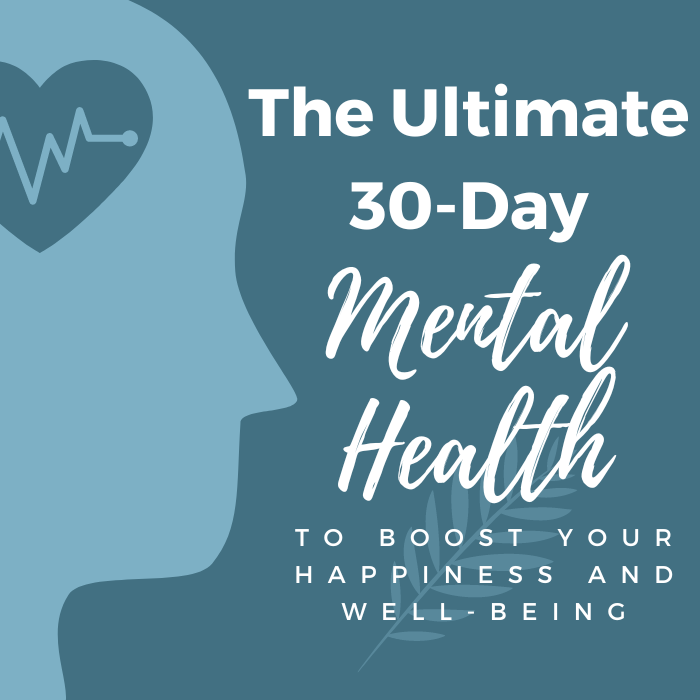We all want to be happy and healthy, but it’s not always easy to maintain a positive mindset and take care of our mental health. In today’s fast-paced world, we often forget to take care of ourselves and put our needs last. But, taking care of our mental health is crucial to our overall well-being. The good news is that you don’t need to make big changes to your life to improve your mental health. All it takes is small daily actions and habits that can make a significant difference in your happiness and well-being. In this article, we’ll explore the ultimate 30-day mental health challenge that can help you boost your happiness and well-being.
The Benefits of Prioritizing Your Mental Health
Why is Mental Health Important?
Mental health is just as important as physical health. It affects how we feel, think, and act in our daily lives. Good mental health is essential for a happy and fulfilling life. When we take care of our mental health, we are more productive, creative, and motivated.
The Benefits of Prioritizing Your Mental Health
Prioritizing your mental health can improve your overall well-being and happiness. Some of the benefits of taking care of your mental health include:
- Reduced stress and anxiety
- Improved mood and emotional stability
- Increased energy and motivation
- Improved relationships with others
- Better sleep quality
- Increased resilience to life’s challenges
The Ultimate 30-Day Mental Health Challenge
How to Start the 30-Day Mental Health Challenge
To get started on the 30-day mental health challenge, you’ll need to commit to making small daily changes in your life. Here are some tips to get started:
- Create a plan: Write down your goals and the small daily actions you’ll take to achieve them.
- Commit: Share your plan with someone you trust and ask them to hold you accountable.
- Track your progress: Keep track of your daily actions and how they make you feel.
The Daily Actions of the 30-Day Mental Health Challenge
Day 1: Write down three things you’re grateful for.
Starting the challenge with gratitude can set the tone for the next 30 days. It’s a simple yet powerful exercise that can help shift your perspective toward positivity.
Day 2: Go for a walk outside.
Spending time in nature can have numerous benefits for your mental health. Going for a walk can improve your mood, reduce stress and anxiety, and help clear your mind.
Day 3: Drink more water.
Staying hydrated is important for overall health, including mental health. Drinking enough water can help improve your mood and cognitive function.
Day 4: Try a new healthy recipe.
Eating a balanced diet can improve your overall well-being. Trying a new healthy recipe can be a fun way to explore different foods and nourish your body.
Day 5: Practice deep breathing.
Deep breathing exercises can help reduce stress and anxiety. It’s a simple technique that can be done anywhere, anytime.
Day 6: Get a good night’s sleep.
Adequate sleep is crucial for mental health. Make sure you get at least 7-8 hours of sleep each night to feel refreshed and energized.
Day 7: Do something kind for someone else.
Performing acts of kindness can boost your mood and increase feelings of happiness. It doesn’t have to be anything big – even small gestures can make a difference.
Day 8: Disconnect from technology for an hour.
Technology can be overwhelming and stressful. Taking a break from screens and social media can help you relax and be more present at the moment.
Day 9: Practice mindfulness.
Mindfulness is the practice of being present at the moment and fully engaged in what you’re doing. It can help reduce stress and increase feelings of calmness.
Day 10: Learn something new.
Learning new things can help boost self-confidence and provide a sense of accomplishment. It can be anything from a new skill to a new language.
Day 11: Practice self-compassion.
Being kind to yourself is crucial for mental health. Practicing self-compassion can help you feel more accepting and less judgmental toward yourself.
Day 12: Spend time in natural light.
Natural light can have a positive effect on your mood and well-being. Try to spend some time outside or in a room with plenty of sunlight.
Day 13: Listen to music you enjoy.
Music can influence our emotions and can be a great tool for stress relief and relaxation.
Day 14: Do a digital detox.
Disconnecting from technology for a longer period can have a significant impact on your mental health. Consider doing a digital detox for a day or two.
Day 15: Practice yoga or stretching.
Yoga and stretching can help reduce stress, improve flexibility, and promote relaxation. It’s a great way to take care of your physical and mental health.
Day 16: Declutter your living space.
A cluttered space can lead to feelings of stress and overwhelm. Take some time to declutter your living space and create a more peaceful environment.
Day 17: Spend time in silence.
Silence can be a powerful tool for mental health. Spend some time in silence, either in meditation or just enjoying a quiet moment.
Day 18: Try a new form of exercise.
Physical activity is essential for mental health. Trying a new form of exercise can be a fun way to mix things up and keep yourself motivated.
Day 19: Practice positive affirmations.
Positive affirmations can help improve self-esteem and promote a more positive outlook on life. Choose affirmations that resonate with you and repeat them to yourself throughout the day.
Day 20: Spend time with a loved one.
Social connections are important for mental health. Spend time with someone you care about and enjoy their company.
Day 21: Do a random act of kindness.
Random acts of kindness can make a big difference in someone’s day and improve your mood as well. It can be anything from buying someone a coffee to writing a thank-you note.
Day 22: Practice gratitude.
Take a few minutes to write down what you’re grateful for today. Practicing gratitude can help shift your focus towards the positive and increase feelings of happiness.
Day 23: Take a mental health day.
If you’re feeling overwhelmed or stressed, taking a mental health day can be a great way to prioritize your well-being and recharge.
Day 24: Try a new hobby.
Engaging in hobbies can provide a sense of fulfillment and enjoyment. Trying a new hobby can be a great way to explore new interests and find something that brings you joy.
Day 25: Volunteer or donate to a charity.
Giving back to others can be a meaningful and fulfilling experience. Consider volunteering your time or donating to a cause you care about.
Day 26: Write in a journal.
Journaling can be a great way to process emotions and clear your mind. Take some time to write about your thoughts and feelings today.
Day 27: Practice self-care.
Self-care can look different for everyone, but it’s important to prioritize activities that make you feel good. Take a bath, read a book, or do something else that helps you relax and unwind.
Day 28: Try a new type of food.
Food can have a significant impact on mental health. Trying a new type of food can be a fun way to explore different flavors and nourish your body.
Day 29: Connect with nature.
Spending time in nature can have numerous benefits for mental health. Go for a hike, visit a park, or spend time near the water.
Day 30: Reflect on the past 30 days.
Take some time to reflect on the past 30 days and how the challenge has impacted your mental health. Consider making some of these actions a regular part of your routine to continue prioritizing your well-being.
Certainly, let’s dive back into mental health and wellness!
Now that we’ve covered some of the benefits of incorporating a 30-day mental health challenge into your routine, let’s explore some specific activities that you can try out during your challenge. Remember, the key to making this work is to choose activities that are enjoyable and sustainable for you.
- Journaling: Writing down your thoughts and emotions can be a powerful tool for managing stress and anxiety. Consider setting aside time each day to reflect on your day, express gratitude, or explore your innermost thoughts.
- Meditation: Practicing mindfulness can help you feel more centered and calm. You might try using an app like Headspace or Calm to guide you through daily meditation.
- Exercise: Physical activity is a proven way to boost mood and reduce stress. Find a type of exercise that you enjoy, whether it’s running, yoga, or dancing, and commit to doing it for at least 30 minutes each day.
- Creativity: Engaging in creative activities like drawing, painting, or playing music can be a great way to reduce stress and boost your mood. Choose an activity that you enjoy and make time for it each day.
- Socializing: Connecting with others is an important part of maintaining mental wellness. Schedule regular phone or video calls with friends or family members, or consider joining a virtual social group.
These are just a few ideas to get you started, but feel free to come up with your activities that feel meaningful and enjoyable to you.
FAQs:
- How can I stay motivated to complete the 30-day challenge?
To stay motivated, it can be helpful to set clear goals and track your progress. Consider using a journal or an app to track your activities each day. You might also enlist the support of a friend or family member to help keep you accountable.
- What if I miss a day?
Don’t worry! The goal of the challenge is to incorporate more mental wellness activities into your routine, but it’s not about being perfect. If you miss a day, simply pick up where you left off the next day.
- Can I modify the challenge to fit my specific needs?
Absolutely. The challenge is meant to be customizable and flexible. If certain activities don’t work for you or that you don’t enjoy, feel free to swap them out for something else.
- How can I make sure I have enough time to complete the activities each day?
It can be helpful to schedule your mental wellness activities at a specific time each day, such as right after waking up or before going to bed. This can help ensure that you have dedicated time for your self-care activities.
- What if I don’t see any improvements in my mental health after completing the challenge?
Remember that mental wellness is an ongoing process and no one-size-fits-all solution exists. If you don’t see immediate improvements, that doesn’t mean the challenge was a failure. Continue to prioritize your mental health and explore different activities and strategies that work for you.
In conclusion, a 30-day mental health challenge can be a powerful tool for cultivating greater mental wellness and resilience. By incorporating a variety of activities that you enjoy, you can establish healthy habits that can benefit you in the long term. Remember to be kind to yourself and to approach the challenge with a spirit of curiosity and openness. Your mental health matters, and investing in it is one of the most important things you can do for yourself.



